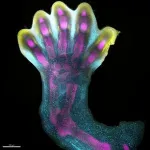(Press-News.org) Researchers have discovered that misreading of therapeutic mRNAs by the cell’s decoding machinery can cause an unintended immune response in the body. They have identified the sequence within the mRNA that causes this to occur and found a way to prevent ‘off-target’ immune responses to enable the safer design of future mRNA therapeutics.
mRNA - or ‘messenger ribonucleic acid’ - is the genetic material that tells cells in the body how to make a specific protein. Researchers from the Medical Research Council (MRC) Toxicology Unit have discovered that the cellular machinery that ‘reads’ mRNAs ‘slips’ when confronted with repeats of a chemical modification commonly found in mRNA therapeutics. In addition to the target protein, these slips lead to the production of ‘off-target’ proteins triggering an unintended immune response.
mRNA vaccines are considered game changing. They have been used to control the COVID-19 pandemic and are already proposed to treat various cancers, cardiovascular, respiratory, and immunological diseases in the future.
This revolutionary class of therapeutics was made possible in part through the work of biochemist Katalin Karikó and immunologist Drew Weissman. They demonstrated that by adding chemical modifications to the bases – the building blocks of mRNA – the synthetic mRNAs could bypass some of our body’s immune defences allowing a therapeutic to enter the cell and exert its effects. This discovery led to their award of the Nobel Prize in Physiology and Medicine in 2023.
The latest developments, led by biochemist Professor Anne Willis and immunologist Dr James Thaventhiran from the MRC Toxicology Unit at the University of Cambridge, build upon previous advances to ensure the prevention of any safety issues linked with future mRNA-based therapeutics. Their report is published today in the journal Nature.
The researchers identified that bases with a chemical modification called N1-methylpseudouridine – which are currently contained in mRNA therapies – are responsible for the ‘slips’ along the mRNA sequence.
In collaboration with researchers at the Universities of Kent, Oxford and Liverpool, the MRC Toxicology Unit team tested for evidence of the production of ‘off-target’ proteins in people who received the mRNA Pfizer vaccine against COVID-19. They found an unintended immune response occurred in one third of the 21 patients in the study who were vaccinated – but with no ill-effects, in keeping with the extensive safety data available on these COVID-19 vaccines.
The team then redesigned mRNA sequences to avoid these ‘off-target’ effects, by correcting the error-prone genetic sequences in the synthetic mRNA. This produced the intended protein. Such design modifications can easily be applied to future mRNA vaccines to produce their desired effects while preventing hazardous and unintended immune responses.
“Research has shown beyond doubt that mRNA vaccination against COVID-19 is safe. Billions of doses of the Moderna and Pfizer mRNA vaccines have been safely delivered, saving lives worldwide,” said Dr James Thaventhiran from the MRC Toxicology Unit, joint senior author of the report.
He added: “We need to ensure that mRNA vaccines of the future are as reliable. Our demonstration of ‘slip-resistant’ mRNAs is a vital contribution to future safety of this medicine platform.”
“These new therapeutics hold much promise for the treatment of a wide range of diseases. As billions of pounds flow into the next set of mRNA treatments, it is essential that these therapeutics are designed to be free from unintended side-effects,” said Professor Anne Willis, Director of the MRC Toxicology Unit and joint senior author of the report.
Thaventhiran, who is also a practising clinician at Addenbrooke’s hospital, said: “We can remove the error-prone code from the mRNA in vaccines so the body will make the proteins we want for an immune response without inadvertently making other proteins as well. The safety concern for future mRNA medicines is that mis-directed immunity has huge potential to be harmful, so off-target immune responses should always be avoided.”
Willis added: “Our work presents both a concern and a solution for this new type of medicine, and result from crucial collaborations between researchers from different disciplines and backgrounds. These findings can be implemented rapidly to prevent any future safety problems arising and ensure that new mRNA therapies are as safe and effective as the COVID-19 vaccines.”
Using synthetic mRNA for therapeutic purposes is attractive because it is cheap to produce, so can address substantial health inequalities across the globe by making these medicines more accessible. Moreover, synthetic mRNAs can be changed rapidly – for example to create a new COVID-19 variant vaccine.
In the Moderna and Pfizer COVID-19 vaccines, synthetic mRNA is used to enable the body to make the spike protein from SARS-CoV-2. The body recognises the viral proteins generated by mRNA vaccines as foreign and generates protective immunity. This persists, and if the body is later exposed to the virus its immune cells can neutralise it before it can cause serious illness.
The cell’s decoding machinery is called a ribosome. It ‘reads’ the genetic code of both natural and synthetic mRNAs to produce proteins. The precise positioning of the ribosome on the mRNA is essential to make the right proteins because the ribosome ‘reads’ the mRNA sequence three bases at a time. Those three bases determine what amino acid is added next into the protein chain. Therefore, even a tiny shift in the ribosome along the mRNA will massively distort the code and the resulting protein.
When the ribosome is confronted with a string of these modified bases called N1-methylpseudouridine in the mRNA, it slips around 10% of the time causing the mRNA to be misread and unintended proteins to be produced – enough to trigger an immune response. Removing these runs of N1-methylpseudouridine from the mRNAs prevents ‘off-target’ protein production.
END
Researchers redesign future mRNA therapeutics to prevent potentially harmful immune responses
2023-12-06
ELSE PRESS RELEASES FROM THIS DATE:
New protein linked to early-onset dementia identified
2023-12-06
Most neurodegenerative diseases, including dementias, involve proteins aggregating into filaments called amyloids. In most of these diseases, researchers have identified the proteins that aggregate, allowing them to target these proteins for diagnostic tests and treatments.
But, in around 10% of cases of frontotemporal dementia, scientists had yet to identify the rogue protein. Now, scientists have pinpointed aggregated structures of the protein TAF15 in these cases.
Frontotemporal dementia results from the degeneration of the frontal and temporal lobes of the brain, which control emotions, personality and behaviour, as well speech and understanding of words. ...
Stellar winds regulate growth of galaxies
2023-12-06
Galactic winds enable the exchange of matter between galaxies and their surroundings. In this way, they limit the growth of galaxies, that is, their star formation rate. Although this had already been observed in the local universe, an international research team led by a CNRS scientist1 has just revealed—using MUSE,2 an instrument integrated into the European Southern Observatory’s (ESO) Very Large Telescope—the existence of the phenomenon in galaxies which are more than 7 billion years old and actively forming stars, the category to which most galaxies belong. The team’s ...
Study finds individuals with acne face social and professional stigma
2023-12-06
Brigham researchers found that individuals with darker skin tones and more severe acne were likely to face greater stigma
Researchers note the importance of treating acne as a medical problem and ensuring access to treatment
A new study highlights how stigmatizing attitudes about individuals with acne may influence social and professional perceptions. Led by investigators from Brigham and Women’s Hospital, a founding member of the Mass General Brigham healthcare system, the study ...
A type of allergy medicine might help treat lung cancer, research suggests
2023-12-06
New York, NY (December 6, 2023)—Researchers at the Icahn School of Medicine at Mount Sinai have identified an allergy pathway that, when blocked, unleashes antitumor immunity in mouse models of non-small cell lung cancer (NSCLC).
And in an early parallel study in humans, combining immunotherapy with dupilumab—an Interleukin-4 (IL-4) receptor-blocking antibody widely used for treating allergies and asthma—boosted patients' immune systems, with one out of the six experiencing significant tumor reduction.
The findings were ...
Economic burden of health conditions associated with adverse childhood experiences among US adults
2023-12-06
About The Study: In this cross-sectional analysis of the U.S. adult population, 63% of adults had adverse childhood experiences (ACEs). The economic burden of ACE-related health conditions was substantial. The findings suggest that measuring the economic burden of ACEs can support decision-making about investing in strategies to improve population health.
Authors: Cora Peterson, Ph.D., of the Centers for Disease Control and Prevention in Atlanta, is the corresponding author.
To access the embargoed study: Visit our For The Media website at this link https://media.jamanetwork.com/
(doi:10.1001/jamanetworkopen.2023.46323)
Editor’s Note: Please ...
Evaluation of stigma toward individuals with acne
2023-12-06
About The Study: This survey study with 1,357 respondents demonstrates that stigmatizing attitudes toward patients with acne existed across a variety of social and professional scenarios, with severe acne and acne in darker skin tone being associated with a greater degree of stigma. These findings highlight the need to identify approaches to reduce stigmatizing attitudes in the community and for adequate access to care, which might prevent negative downstream effects related to these stigmatizing attitudes.
Authors: John ...
COVID-19 rapid antigen tests with self-collected vs health care worker–collected nasal and throat swab specimens
2023-12-06
About The Study: This randomized clinical trial found that a single health care worker-collected throat specimen had higher sensitivity for rapid antigen testing for SARS-CoV-2 than a nasal specimen. In contrast, the self-collected nasal specimens had higher sensitivity than throat specimens for symptomatic participants. Adding a throat specimen to the standard practice of collecting a single nasal specimen could improve sensitivity for rapid antigen testing in health care and home-based settings.
Authors: Tobias Todsen, M.D., Ph.D., of Copenhagen University Hospital in ...
First map of human limb development reveals unexpected growth processes and explains syndromes found at birth
2023-12-06
Human fingers and toes do not grow outward; instead, they form from within a larger foundational bud, as intervening cells recede to reveal the digits beneath. This is among many processes captured for the first time as scientists unveil a spatial cell atlas of the entire developing human limb, resolved in space and time.
Researchers at the Wellcome Sanger Institute, Sun Yat-sen University, EMBL’s European Bioinformatics Institute and collaborators applied cutting-edge single-cell and spatial technologies to create an atlas characterising the cellular landscape of the early human limb, pinpointing the exact ...
Stanford Medicine-led study finds way to predict which of our organs will fail first
2023-12-06
Like any typical car or house or society, the pace at which parts of our bodies fall apart varies from part to part.
A study of 5,678 people, led by Stanford Medicine investigators, has shown that our organs age at different rates — and when an organ’s age is especially advanced in comparison with its counterpart in other people of the same age, the person carrying it is at heightened risk both for diseases associated with that organ and for dying.
According to the study, about 1 in every 5 reasonably ...
Bowtie resonators that build themselves bridge the gap between nanoscopic and macroscopic
2023-12-06
A central goal in quantum optics and photonics is to increase the strength of the interaction between light and matter to produce, e.g., better photodetectors or quantum light sources. The best way to do that is to use optical resonators that store light for a long time, making it interact more strongly with matter. If the resonator is also very small, such that light is squeezed into a tiny region of space, the interaction is enhanced even further. The ideal resonator would store light for a long time in a region at the size of a single atom.
Physicists and engineers have struggled for decades with how ...






